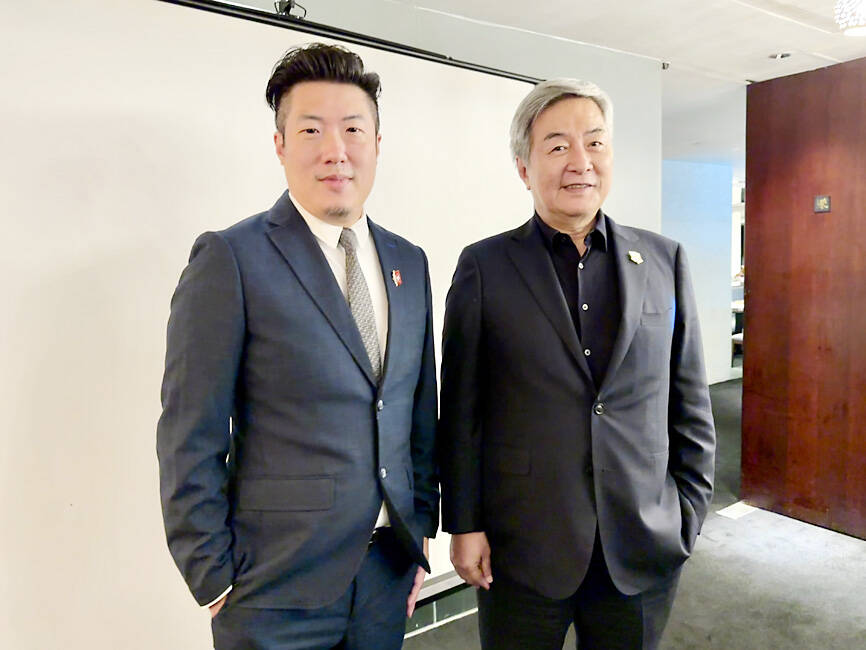CviLux Corp (瀚荃), which makes connectors and wiring harnesses for servers and computers, yesterday said it is accelerating capacity expansion in Southeast Asia, following in the step of key customers exiting China amid its trade dispute with the US.
Based in New Taipei City’s Tamsui District (淡水), CviLux started to expand to Southeast Asia five or six years ago, building its first plant in Laos with an eye on its cheap labor costs, a stable political environment and geographical advantages.
The factory mainly produces custom-made cables and wiring harnesses for TVs and connectors.

Photo: Fang Wei-chieh, Taipei Times
This year, the company is expanding to Vietnam, where it is building new capacity at leased facilities in Hanoi to produce connectors for notebook computers and servers, as major Taiwanese notebook computer makers such as Compal Electronics Inc (仁寶) and Quanta Computer Inc (廣達) allocate production there.
“Taiwanese manufacturers decades ago allocated production to China because of cheap labor. Now we are moving to Southeast Asia amid a supply chain shift,” CviLux chief executive officer Lawrence Yang (楊奕康) told reporters at a media event in Taipei.
CviLux is also planning new facilities in Thailand and Malaysia to make connectors and wiring harnesses for vehicles and consumer electronic devices such as earphones, Yang said.
The new factories in Southeast Asia are to start operations in the second quarter of next year, he said.
Those production capacity allocations will reduce CviLux’s dependence on Chinese capacity, he said.
By the end of next year, the company’s Chinese capacity would be about 60 percent of its overall capacity, down from 80 percent now, Yang said.
“We are following the requests of our customers,” Yang said. “They hope we can operate factories in three different areas.”
CviLux aims to increase its revenue by 20 percent next year, picking up from a trough this year, he said.
“Next year will be a better year than this year, as we plan to introduce new products,” he said.
Notebook computers and artificial intelligence (AI) servers would be among the main growth drivers, thanks to falling inventory levels and replacement demand next year, the company said.
Moreover, the EU has mandated that type-C charging ports be used for all mobile devices, stimulating demand for related components, it said.
CviLux said revenue from AI-related products is expected to expand 20 percent year-on-year next year.
The company also expects demand for its components to increase, thanks to major customers’ plans to hike capital spending and rising installations of green energy devices, it said.
CviLux reported that net profit in the first three quarters of this year plummeted 35 percent to NT$203 million (US$6.44 million) from NT$311 million a year earlier, or an earnings per share drop to NT$2.6 from NT$3.97.
Gross margin improved to 33.8 percent from 29.17 percent over the same period, the company said.
Revenue in the first three quarters plunged 24 percent annually to NT$2.98 billion, with servers and networking devices business making up 29 percent of the total and notebook computer business next with a 28 percent share.

The US dollar was trading at NT$29.7 at 10am today on the Taipei Foreign Exchange, as the New Taiwan dollar gained NT$1.364 from the previous close last week. The NT dollar continued to rise today, after surging 3.07 percent on Friday. After opening at NT$30.91, the NT dollar gained more than NT$1 in just 15 minutes, briefly passing the NT$30 mark. Before the US Department of the Treasury's semi-annual currency report came out, expectations that the NT dollar would keep rising were already building. The NT dollar on Friday closed at NT$31.064, up by NT$0.953 — a 3.07 percent single-day gain. Today,

‘SHORT TERM’: The local currency would likely remain strong in the near term, driven by anticipated US trade pressure, capital inflows and expectations of a US Fed rate cut The US dollar is expected to fall below NT$30 in the near term, as traders anticipate increased pressure from Washington for Taiwan to allow the New Taiwan dollar to appreciate, Cathay United Bank (國泰世華銀行) chief economist Lin Chi-chao (林啟超) said. Following a sharp drop in the greenback against the NT dollar on Friday, Lin told the Central News Agency that the local currency is likely to remain strong in the short term, driven in part by market psychology surrounding anticipated US policy pressure. On Friday, the US dollar fell NT$0.953, or 3.07 percent, closing at NT$31.064 — its lowest level since Jan.

The New Taiwan dollar and Taiwanese stocks surged on signs that trade tensions between the world’s top two economies might start easing and as US tech earnings boosted the outlook of the nation’s semiconductor exports. The NT dollar strengthened as much as 3.8 percent versus the US dollar to 30.815, the biggest intraday gain since January 2011, closing at NT$31.064. The benchmark TAIEX jumped 2.73 percent to outperform the region’s equity gauges. Outlook for global trade improved after China said it is assessing possible trade talks with the US, providing a boost for the nation’s currency and shares. As the NT dollar

The Financial Supervisory Commission (FSC) yesterday met with some of the nation’s largest insurance companies as a skyrocketing New Taiwan dollar piles pressure on their hundreds of billions of dollars in US bond investments. The commission has asked some life insurance firms, among the biggest Asian holders of US debt, to discuss how the rapidly strengthening NT dollar has impacted their operations, people familiar with the matter said. The meeting took place as the NT dollar jumped as much as 5 percent yesterday, its biggest intraday gain in more than three decades. The local currency surged as exporters rushed to